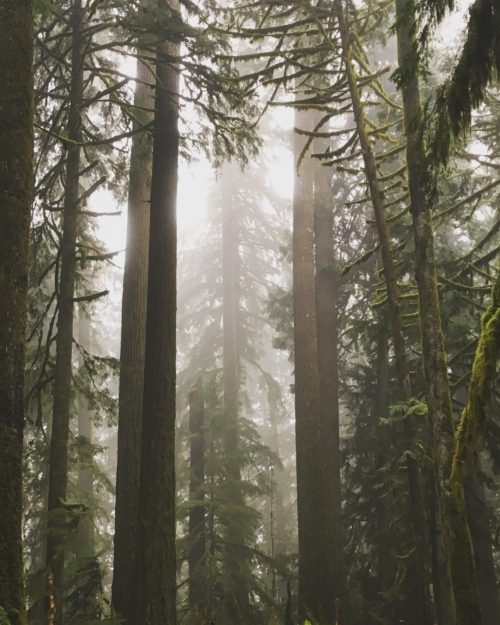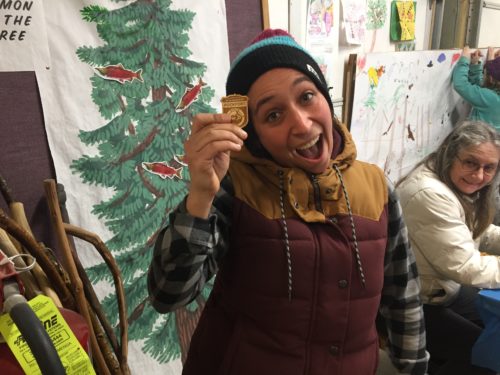You’re Never Too Old to be a Junior Ranger
Recently, graduate student Marissa Bluestein became a volunteer at Rockport State Park. She also earned her Junior Ranger badge and learned about old growth forest ecology. Below are her words on the experience:
I stood with my right hand raised in the converted maintenance shed serving as the Discovery Center at Rockport State Park and repeated after Ranger Amos:
As a junior ranger, I promise to protect the environment, pick up trash, explore the outdoors and protect state parks for current and future generations.
It was my first day volunteering at Rockport State Park, and I’d just went on my first guided hike. Within 45 minutes, I learned that Rockport has one of the last remaining old growth forests in the Skagit Valley, with some trees as old as 500 years. The Park’s camping is now forever closed due to diseases invading these old trees, causing them to die and fall.
The forest is made up of salmon. Salmon hatch in freshwater and make their way to the ocean where they eat food containing Nitrogen 15. Nitrogen 15 is only found in the ocean, and as salmon make their way back up their river of origin to spawn, they carry that chemical makeup with them. After salmon die, their bodies are taken from the river by eagles, which sometimes drop carcasses in the forest, or they are drug into the forest by bears and other wildlife. Salmon remains are left on the ground. The decaying fish enrich the soil with Nitrogen 15 which help trees grow taller faster and are more resilient to drought and parasites.
 Photo of Rockport State Park by Marissa Bluestein
Photo of Rockport State Park by Marissa Bluestein
The “wood wide web” also plays an integral part in the health of Rockport’s old growth forest. Mycorrhizal fungi live in underground networks and help trees grow. They share a symbiotic relationship with trees by providing them with nutrients like nitrogen from bugs underground, and in turn trees provide the fungi with sugars they make from photosynthesizing. In one handful of soil there can be up to 7 miles of fungus. All trees everywhere need this relationship to survive. Without it, trees wouldn’t be able to grow bigger than a tulip!
My hiking group consisted of a myriad of people. Older couples from Seattle journeying up for the Eagle Fest, young couples with their dogs and people wanting to explore Rockport’s old growth forests. Everyone shared a love of learning and a curiosity of nature. As a graduate student at the North Cascades Institute, my free time is scarce to non-existent, but volunteering at Rockport State Park is time well spent.
Greeting visitors at the Discovery Center and seeing kids faces light up when I tell them they can touch the display animals makes it a worthwhile Saturday afternoon. Being able to teach people about the region they live in feels special to me. After the group hike one couple came up to me and asked what else there was to see in the area and my response was how much time do you have? I then took them over to the map and showed them where they were on Highway 20 and said if you drive 1.5 miles east you’ll hit Howard Miller Steelhead County Park where the Bald Eagle Interpretive Center is, drive 20 more miles east and you’ll be in the North Cascades National Park.
The North Cascades National park is one of the least visited national parks in the United States, but is one of the most diverse in flora and fauna. The couple seemed surprised that these natural gems were only a few hours away from their hometown of Seattle. Showing people all the possible places to explore and talking about the plants and animals that inhabit that natural space is not only important for them to learn, but also to bring awareness to the area. The more people know about the place they live in, the more inclined they are to care, protect and take responsibility for it.

Which it why the Junior Ranger program is so important. When brothers Dash and Landen came to the Discovery Center, they picked up a Junior Ranger booklet. Through the completion of activities, they developed a better relationship with the land. When they then raised their hands and repeated the Junior Ranger pledge after me, they felt like they had a responsibility to the park. Even as you get older the excitement of becoming a junior ranger doesn’t go away. Learning new things about the place where you are, and taking a pledge to protect it, is still exciting and gives you that feeling that you have a part in protecting the land. And that’s why I became a junior ranger at Rockport State Park.

